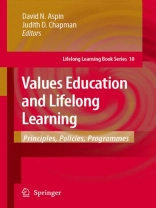The aim of this book is to provide an easily accessible, practical yet scholarly source of information about the international concern for the nature, theory and practices of the ideas of values education and lifelong learning. Each chapter in this book is written in an accessible style by an international expert in the field. Authors tackle the task of identifying, analysing and addressing the key problems, topics and issues relevant to questions about the nature, purpose and scope of values education and Lifelong Learning that are internationally generalisable and, in times of rapid change, of enduring interest to the scholar and practitioner. Authors explore the ways and means by which learners may be encouraged to become educated and grow, both as individual beings and social agents, throughout the whole of their lifespan.
The book seeks to provide accounts and critical appraisal of some of the different principles, philosophies, theories, beliefs, traditions and cultures that might form the basis of, frame and furnish the setting for values education policies and programs. We look at some of the main theories behind versions of value in lifelong learning and we point to some of the key concepts and categories at work in such theories. We provide reference to and accounts of some examples of policies or proposals in various national contexts and a range of examples of good practice in policies, programs and curriculum schemes from different schools, school systems and other educating agencies, institutions and organisations around the world.
Jadual kandungan
The Ontology of Values and Values Education.- Opening the Road to Values Education.- The Ethics of Lifelong Learning and its Implications for Values Education.- Values Education in Context.- Rational Autonomy as an Educational Aim.- Avoiding Bad Company: The Importance of Moral Habitat and Moral Habits in Moral Education.- How Cognitive and Neurobiological Sciences Inform Values Education for Creatures Like us.- Challenges for Values Education Today: In Search of a Humanistic Approach for the Cultivation of the Virtue of Private Citizenship.- Combining Values and Knowledge Education.- Formalizing Institutional Identity: A Workable Idea?.- Values Education: The Missing Link in Quality Teaching and Effective Learning.- A Vision Splendid?.- “What Kinds of People are We?”: Values Education After Apartheid.- Anti-egoistic School Leadership: Ecologically Based Value Perspectives for the 21st Century.- Teaching for a Better World: The Why and How of Student-initiated Curricula.- The Neglected Role of Religion and Worldview in Schooling for Wisdom, Character, and Virtue.- Clusters and Learning Networks: A Strategy for Reform in Values Education.- Values Education and Lifelong Learning: Policy Challenge.- Lifelong Learning in Asia: Eclectic Concepts, Rhetorical Ideals, and Missing Values. Implications for Values Education.- Lifelong Learning, Adult Education, and Democratic Values: Evoking and Shaping an Inclusive Imagination.- Whole-School Approaches to Values Education: Models of Practice in Australian Schools.












